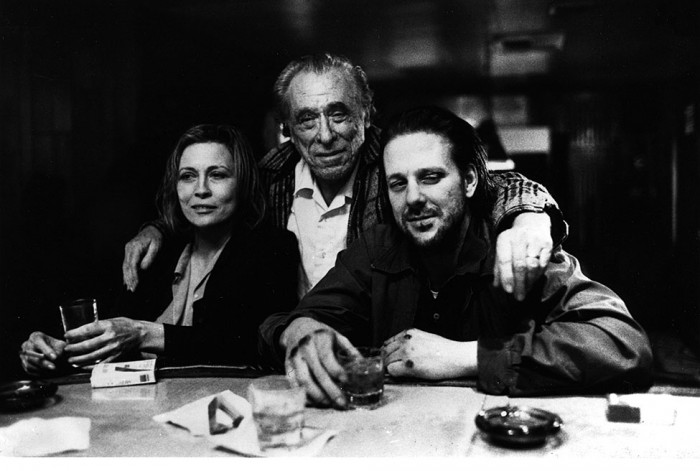Deemed a “laureate of American lowlife” by Time in 1986, Charles Bukowski was a 20th century poet, novelist, and working-class alcoholic. His deadpan confessional style, glorification of alcohol, and misanthropic view of humanity has appealed to a large cult readership over the years. In 1987, unknown to most, Bukowski entered the Hollywood scene alongside director Barbet Schroeder, who urged him to write the screenplay for his next film. Claiming to despise the art of filmmaking, Bukowski accepted Schroeder’s offer only after considering the number of drinks he could buy with his paycheck. Barfly is essentially a simplistic, misanthropic Bukowski novel put on the big screen.
Mickey Rourke is the star of Barfly, playing the scruffy, staggering Bukowski alter-ego, Henry Chinaski. As the story centers on the routine life of a drunk, the film is more of a character study than a plot-based action story. Henry spends his days at the Golden Horn, a gritty bar occupied by a cast of regulars taking up the same stools everyday. Demonstrating the circular flow of a life composed of drinking, writing, and paying rent, the film opens and closes on the same scene: a bar fight between Henry and the bartender, Big Ed (Frank Stallone). Big Ed despises Henry, and Henry hates him back, saying: “He symbolizes everything that disgusts me. Obviousness. Unoriginal macho energy. Ladies man…”
One day, Henry spots Wanda (Faye Dunaway) across from him at the bar. Asking why she sits alone, Henry receives a response that she is “crazy.” This intrigues Henry, who later writes on a piece of paper: “Some people never go crazy. What truly horrible lives they must lead.” He orders Wanda a drink and the conversation that follows attests to Bukowski’s adeptness in scripting dialogue. While it’s clear that Wanda is a regular barfly, she has a natural aplomb that isolates her from her surroundings.
“I can’t stand people,” Wanda tells Henry as he takes the stool next to her. “I hate them. Do you hate them?” “No,” Henry responds. “But I seem to feel better when they’re not around.”
Upon discovering that Henry is totally broke, Wanda invites him to stay at her place. A hint of her crazy side shines as she runs uphill to a field to pick green, unripe corn, exclaiming: “I love corn!” while Henry reminds her that she’s drunk. Police headlights shine on Wanda, given that she is trespassing, and the two quickly abscond to her apartment. Henry and Wanda are unadjusted to love, yet an intimacy develops between the two barflies. Therefore, when Wanda smells perfume on Henry one day, she is outraged.
The perfume is from the beautiful, delicate, and wealthy girl (Alice Krige), who publishes a literary magazine and has tracked down Henry to hand him his paycheck. She compliments Henry on his work and Henry is amused, since he always believed he would be discovered posthumously. She and Henry arrive at her house, and they flirt and drink. When she offers him space in her home to write, he declines. “I take it you don’t care for my world,” she says. Henry replies: “Well, baby, look around. It’s a cage with golden bars.”
Bukowski was known to loathe the monotonous structure of daily life. He once claimed that the nine-to-five work day was one of the greatest atrocities sprung upon mankind and that he was so repelled by the idea that he was driven to “drink, starvation, and mad females, simply as an alternative.” Barfly is overall a glorification of a vision of freedom and a tale of love between two misanthropes. In Bukowski’s own words, the film is “better than the average movie.”








